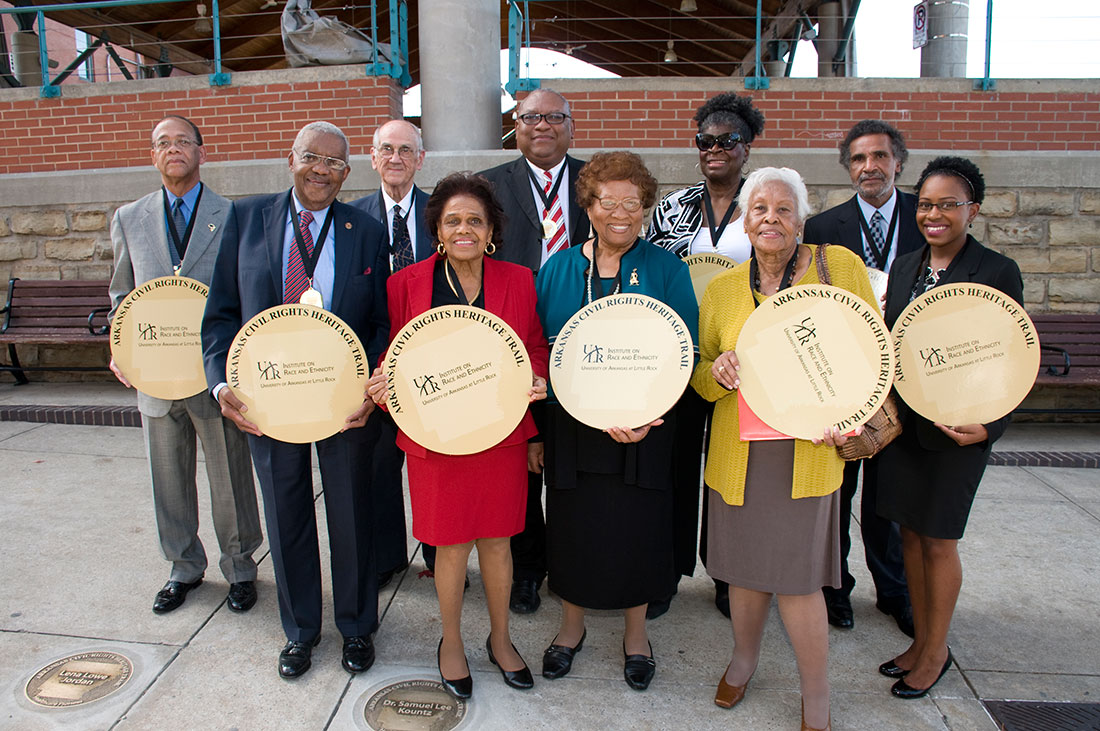UALR institute announces 14 new Arkansas Civil Rights Heritage Trail honorees
The University of Arkansas at Little Rock Institute on Race and Ethnicity has announced the names of the honorees for the 2015 Arkansas Civil Rights Heritage Trail. This year’s theme is “Politics and Law” to commemorate the 50th anniversary of the passage of the Voting Rights Act of 1965.
The unveiling of the latest plaques on the trail will take place at 3 p.m. Thursday, Nov. 12, at the corner of Scott and East Markham streets. The event is free and open to the public.
Established in the summer of 2011, the Arkansas Civil Rights Heritage Trail honors those who made significant contributions to civil rights in Arkansas. The trail raises public awareness of the long and rich legacy of Arkansas’s civil rights history.
A 12-inch bronze marker is placed in the sidewalk for each honoree. The trail begins in front of the Old State House Convention Center on Markham Street and will eventually extend to the William J. Clinton Presidential Center and Park and other points throughout the downtown corridor.
“The Arkansas Civil Rights Heritage Trail unveiling is the signature event of the Institute in its fall program,” said Institute Director John Kirk. “This year, the event will coincide with the Southern Historical Association (SHA) conference in Little Rock.”
Kirk is the local arrangements chair for the conference, which will bring 1,200 historians to Little Rock. The Civil Rights Heritage Trail unveiling ceremony will launch the conference.
“The Institute will partner with the SHA in its opening plenary session that evening on ‘Justice After the Civil Rights Movement’ featuring nationally recognized speakers,” Kirk said.
This year’s 14 honorees are:
- Annie Mae Bankhead, who was a community activist in Pulaski County’s black College Station neighborhood
- Wiley Branton, Sr., who was head of the Southern Regional Council’s Voter Education Project in the 1960s
- Charles Bussey, who was leader of the Veterans Good Government Association and became Little Rock’s first black mayor in 1980
- William Harold Flowers, who laid the foundations for the Arkansas State Conference of National Association for the Advancement of Colored People branches
- Jeffrey Hawkins, who was for decades the unofficial mayor of Little Rock’s black East End neighborhood
- Irma Hunter Brown, who was the first black woman elected to the Arkansas General Assembly
- Scipio Africanus Jones, a leading black Republican who defended 12 prisoners for their role in the 1919 Elaine Race Riot
- Mahlon Martin, who was the first black city manager of Little Rock
- I.S. McClinton, who was head of the Arkansas Democratic Voters Association, a forerunner of today’s Black Democratic Caucus
- Richard L. Mays and Henry Wilkins III, who were among the first blacks elected to the Arkansas General Assembly in the 20th century in 1972
- Olly Neal, who was the first black district prosecuting attorney in Arkansas and later served on the Arkansas Court of Appeals
- Lottie Shackelford, who was the first black woman mayor of Little Rock
- John Walker, who for more than five decades has been involved in civil rights activism in the courts, most notably in school desegregation cases
